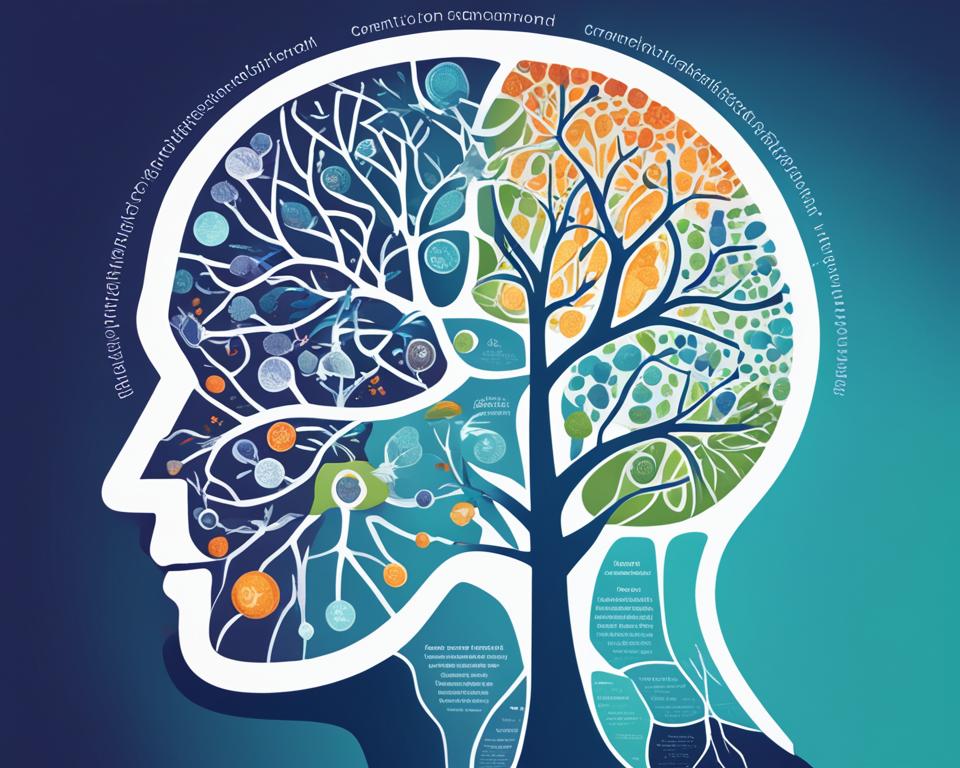As a professional copywriting journalist, I am thrilled to explore the exciting advancements in biotechnology and genetic engineering that are revolutionizing the field of mental health. In this article, we will delve into the potential of genetic approaches, such as gene editing, CRISPR technology, and recombinant DNA techniques, to enhance brain function and optimize mental well-being. By examining the latest research, challenges, and ethical considerations in this rapidly evolving area of personalized brain enhancement, we will uncover the promising future of mental health treatment and prevention.
The landscape of mental health is undergoing a profound transformation, driven by the remarkable progress in the realms of biotechnology and genetic engineering. From the groundbreaking development of CRISPR gene editing tools to the advancements in recombinant DNA technology, we are witnessing a paradigm shift in how we understand and address mental disorders. These innovative approaches hold the potential to unlock new frontiers in brain enhancement, paving the way for a future where we can optimize cognitive function, regulate mood, and even prevent the onset of debilitating mental illnesses.
As we delve deeper into this exciting frontier, it is crucial to navigate the complex ethical and societal implications that arise. Questions of accessibility, equitable distribution, and the potential for misuse must be carefully considered. Yet, the promise of personalized brain enhancement, enabled by the power of genetics and biotechnology, offers a glimmer of hope in tackling the global mental health crisis.
Key Takeaways
- Advancements in biotechnology and genetic engineering are revolutionizing the field of mental health.
- Gene editing, CRISPR technology, and recombinant DNA techniques hold the potential to enhance brain function and optimize mental well-being.
- The latest research in this rapidly evolving area explores the challenges and ethical considerations of personalized brain enhancement.
- Genetic approaches to mental health offer promising solutions for addressing the global mental health crisis.
- Navigating the complex ethical and societal implications of these technologies is crucial for their responsible development and implementation.
The Burden of Mental Illness
As we delve into the transformative potential of biotechnology and genetic engineering in the realm of mental health, it is crucial to first understand the significant burden posed by mental illness on a global scale. The prevalence of various mental disorders, their staggering economic impact, and the persistent stigma and discrimination faced by those affected set the stage for the urgent need for innovative solutions.
Global Prevalence and Economic Impact
According to the World Health Organization (WHO), mental disorders affect an estimated 1 in 8 people worldwide, with depression and anxiety being the most common. The economic burden of these conditions is equally staggering, with the global cost of mental health issues estimated to reach a staggering $6 trillion by 2030. The loss of productivity, healthcare expenditures, and the impact on individuals and their families underscore the immense toll of mental illness.
Stigma and Discrimination
Despite the widespread prevalence of mental health conditions, the lingering stigma and discrimination surrounding them continue to pose significant challenges. Individuals with mental disorders often face social isolation, employment challenges, and barriers to accessing quality healthcare. This pervasive stigma not only exacerbates the burden but also hinders the pursuit of effective treatments and support systems.
Comorbidities and Reduced Life Expectancy
The burden of mental illness extends beyond the immediate psychological impact, as it is often accompanied by a range of comorbidities. Individuals with mental disorders frequently experience higher rates of physical health problems, such as cardiovascular disease, diabetes, and obesity. This complex interplay between mental and physical health can lead to a reduced life expectancy of up to 20 years for those affected.
As we grapple with the staggering scale and multifaceted nature of the global mental health crisis, the urgent need for innovative solutions becomes increasingly clear. The advancements in gene editing, CRISPR technology, and recombinant DNA techniques hold the promise of revolutionizing our understanding and treatment of mental disorders, offering new pathways to enhance brain function and optimize mental well-being.
Current Treatments and Their Limitations
The field of mental health has long relied on a combination of psychotherapy and pharmacotherapy as the primary approaches to treatment. While these modalities have provided some relief for individuals struggling with mental disorders, they are not without their limitations.
Psychotherapy and Pharmacotherapy
Psychotherapy, which encompasses a range of counseling and talk-based interventions, has been shown to be effective in addressing a variety of mental health conditions, from depression and anxiety to post-traumatic stress disorder. However, the effectiveness of psychotherapy can be influenced by factors such as the individual’s response to the therapy, the skill of the therapist, and the availability of accessible and affordable mental health services.
Pharmacotherapy, on the other hand, primarily involves the use of psychoactive medications, such as antidepressants, anti-anxiety drugs, and mood stabilizers. While these medications can provide symptom relief for many individuals, their effectiveness is often limited, with only a modest improvement in overall outcomes for some patients.
Side Effects and Treatment Resistance
One of the significant limitations of current mental health treatments is the prevalence of side effects associated with psychotropic medications. Many of these drugs can cause a range of undesirable side effects, including weight gain, sexual dysfunction, and cognitive impairment, which can further exacerbate the patient’s distress and reduce treatment adherence.
Furthermore, a substantial proportion of individuals with mental disorders experience treatment resistance, where they fail to respond adequately to conventional pharmacological and psychotherapeutic interventions. This phenomenon highlights the need for more innovative and personalized approaches to mental health care, such as those enabled by advancements in biotechnology and genetic engineering.

As the limitations of traditional mental health treatments become increasingly apparent, the potential of genetic and biotechnological approaches to brain enhancement and personalized therapy holds promise for addressing the global mental health crisis. The following sections will delve deeper into the role of gene editing, CRISPR, and other recombinant DNA technologies in revolutionizing the field of mental health.
The Diagnostic Dilemma
The field of psychiatry has long grappled with the complexities and challenges of accurately diagnosing mental disorders. The prevailing diagnostic systems, such as the Diagnostic and Statistical Manual of Mental Disorders (DSM) and the International Classification of Diseases (ICD), have been the subject of criticism for their reliance on symptom-based classifications that often fail to capture the underlying biological mechanisms of mental health conditions.
Challenges in Psychiatric Nosology
The diagnostic dilemma in psychiatry is rooted in the inherent difficulties of categorizing and defining mental disorders. Unlike many physical ailments, mental health conditions often exhibit a high degree of heterogeneity, with individuals presenting with diverse symptoms and varying degrees of severity. This heterogeneity has led to concerns about the validity and reliability of current diagnostic frameworks, as they may not accurately reflect the true nature of these complex disorders.
Moreover, the comorbidity of mental disorders, where individuals often experience multiple conditions simultaneously, further complicates the diagnostic process. The frequent overlap of symptoms between different mental health conditions has made it challenging to establish clear-cut boundaries and distinct categories, leading to diagnostic uncertainty and ambiguity.
Alternative Approaches: RDoC and HiTOP
In response to the limitations of the existing diagnostic systems, researchers and clinicians have explored alternative frameworks that aim to move beyond symptom-based classifications. One such approach is the Research Domain Criteria (RDoC), developed by the National Institute of Mental Health (NIMH). RDoC seeks to incorporate biologically-grounded dimensions of mental function, such as cognition, gene editing, and recombinant DNA, into the diagnostic process.
Another alternative is the Hierarchical Taxonomy of Psychopathology (HiTOP), which proposes a dimensional model of mental disorders. HiTOP aims to capture the underlying structure of psychopathology by organizing mental health conditions into a hierarchical system, where broad spectra of disorders are further subdivided into more specific manifestations. This approach emphasizes the dimensional nature of mental health, rather than relying on discrete categories.
These alternative frameworks, such as RDoC and HiTOP, represent a shift towards a more biologically-grounded and dimensional understanding of mental disorders. By incorporating genetic engineering, recombinant DNA, and other advancements in biotechnology, these approaches aim to enhance the accuracy and precision of psychiatric diagnosis, ultimately leading to more effective interventions and personalized treatment strategies.
The Role of Genetics in Mental Disorders
The field of psychiatric genetics has made remarkable strides in unraveling the complex relationship between genetics and the development of mental disorders. Researchers have leveraged a range of genetic approaches to shed light on the heritable and biological underpinnings of these conditions, paving the way for more targeted and personalized interventions.
Heritability and Twin Studies
Early research in psychiatric genetics focused on establishing the heritability of mental disorders through twin and family studies. These investigations have consistently demonstrated that genetic factors play a significant role in the etiology of conditions such as schizophrenia, bipolar disorder, and major depressive disorder. By studying the concordance rates between monozygotic (identical) and dizygotic (fraternal) twins, researchers have been able to estimate the relative contributions of genetic and environmental influences on the risk of developing various mental health conditions.
From Candidate Genes to Genome-Wide Association Studies
The candidate gene approach, where researchers investigated the potential involvement of specific genes in mental disorders, yielded limited success. The limitations of this method paved the way for the emergence of genome-wide association studies (GWAS), which have revolutionized psychiatric genetics. GWAS have enabled the identification of numerous genetic variants associated with mental disorders, providing a more comprehensive understanding of the complex genetic architecture underlying these conditions.
Rare Variants and Copy Number Variations
In addition to common genetic variants identified through GWAS, researchers have also uncovered the role of rare genetic variants and copy number variations (CNVs) in mental disorders. These structural variations in the genome, which involve the deletion or duplication of DNA segments, have been linked to an increased risk of conditions such as autism spectrum disorder, schizophrenia, and intellectual disability. The study of rare variants and CNVs has provided valuable insights into the biological pathways and molecular mechanisms underlying the development of mental disorders.

The evolving landscape of psychiatric genetics has transformed our understanding of mental disorders, paving the way for more targeted and personalized approaches to diagnosis, prevention, and treatment. By unraveling the complex interplay between genetics and the development of mental health conditions, researchers are poised to unlock new frontiers in the field of biotechnology and genetic engineering, ultimately improving the lives of those affected by mental illness.
Biotechnology and Genetic Engineering
The field of biotechnology and genetic engineering has revolutionized our understanding and approaches to mental health. Advancements in recombinant DNA technology, the development of genetically modified organisms (GMOs), and breakthroughs in genomics and DNA sequencing have paved the way for innovative solutions to address the global mental health crisis.
Recombinant DNA Technology and Genetically Modified Organisms
Recombinant DNA technology, which involves the manipulation of genetic material to create novel combinations of genes, has opened up new avenues for researchers studying mental disorders. The ability to engineer transgenic organisms, such as genetically modified animals, has provided invaluable tools for investigating the genetic underpinnings of psychiatric conditions and testing potential therapies. These genetically modified models have shed light on the complex interplay between genes, brain structure, and cognitive function, paving the way for more targeted and personalized interventions.
Genomics and DNA Sequencing
The rapid advancements in genomics and DNA sequencing technologies have revolutionized our understanding of the genetic basis of mental disorders. Genome-wide association studies (GWAS) have identified numerous genetic variants associated with various psychiatric conditions, while the study of rare variants and copy number variations has further expanded our knowledge of the genetic architecture of mental health. This wealth of genomic data, coupled with advancements in bioinformatics and data analysis, has enabled researchers to uncover novel biological pathways and potential drug targets for the development of more effective treatments.
Gene Editing and CRISPR
The advent of gene editing technologies, particularly the CRISPR-Cas9 system, has opened up new possibilities in the field of mental health research and treatment. CRISPR, a highly precise and efficient tool for modifying genetic sequences, holds the potential to correct disease-causing mutations, silence harmful genes, and even enhance cognitive abilities. While the ethical implications of using gene editing for brain enhancement require careful consideration, the therapeutic applications of CRISPR in treating neuropsychiatric disorders, such as schizophrenia, autism, and mood disorders, are actively being explored.
Emerging Insights from Psychiatric Genomics
The rapid advancements in biotechnology and genetic engineering have ushered in a new era of psychiatric genomics, unlocking a deeper understanding of the genetic underpinnings of mental disorders. Researchers have made significant strides in identifying genetic risk factors and mapping the biological pathways associated with various psychiatric conditions, paving the way for the development of novel drug targets and personalized treatment approaches.
Biological Pathways and Potential Drug Targets
Through large-scale genome-wide association studies (GWAS) and the application of sophisticated recombinant DNA technology, scientists have uncovered an array of genetic variants linked to mental health disorders, such as schizophrenia, bipolar disorder, and depression. By analyzing these genetic markers and their effects on transgenic organisms and genetically modified organisms (GMOs), researchers are now able to delineate the specific biological pathways that contribute to the development of these conditions. This knowledge has ignited a search for pharmaceutical biotechnology and gene therapy approaches that can target these pathways, opening up new avenues for drug discovery and therapeutic interventions.
Polygenic Risk Scores and Precision Medicine
Alongside the identification of individual genetic risk factors, the field of psychiatric genomics has also witnessed the emergence of polygenic risk scores (PRS) – a powerful tool that aggregates the effects of multiple genetic variants to provide a more comprehensive assessment of an individual’s genetic predisposition to mental disorders. These PRS, combined with advancements in bioinformatics and DNA sequencing, are paving the way for a precision medicine approach in mental health care. By integrating an individual’s genetic profile with other clinical and environmental factors, healthcare providers can now tailor interventions and preventive strategies more accurately, enabling more personalized and effective management of mental health conditions.

Gene-Environment Interactions
As biotechnology and genetic engineering continue to revolutionize our understanding of mental health, it’s crucial to explore the complex interplay between genetic and environmental factors. This interplay, often referred to as gene-environment interactions, is a crucial piece of the puzzle in unraveling the development and progression of mental disorders.
Epigenetics and Environmental Exposures
One of the key insights from this field is the role of epigenetics, where environmental exposures can modify gene expression without altering the underlying DNA sequence. This dynamic process can have profound implications for mental health, as factors such as stress, trauma, or even diet and lifestyle can influence the expression of genes linked to various psychiatric conditions. By understanding these epigenetic mechanisms, researchers are uncovering new avenues for targeted interventions and personalized treatments.
Gene-Environment Correlation and Causation
Disentangling the complex interplay between genes and the environment presents a significant challenge in psychiatric research. Establishing causation, rather than mere correlation, is crucial in order to develop effective strategies for prevention and treatment. Advancements in biotechnology, including the use of large-scale genomic studies and sophisticated statistical modeling, are helping researchers tease apart these intricate relationships and uncover the true drivers of mental health outcomes.
As we continue to explore the intersection of genetics, epigenetics, and environmental influences, the insights garnered from this field of research will undoubtedly shape the future of mental health care. By unlocking the secrets of gene-environment interactions, we can move closer to a more comprehensive and personalized approach to addressing the global burden of mental illness.
FAQ
What is the potential of genetic approaches to enhance brain function and optimize mental well-being?
What is the global burden of mental illness, and why is there an urgent need for innovative solutions?
What are the challenges in the current psychiatric diagnostic systems, and how are alternative frameworks like RDoC and HiTOP addressing them?
How have the advancements in psychiatric genetics research, from heritability studies to genome-wide association studies, informed our understanding of the genetic factors underlying mental disorders?
What are the key biotechnological and genetic engineering advancements that are enabling new approaches to mental health research and treatment?
How are the insights from psychiatric genomics research informing the development of novel treatments and personalized medicine approaches for mental health?
What is the role of gene-environment interactions, including epigenetics, in the development of mental disorders, and how does this complexity challenge our understanding?
Source Links
- https://www.ncbi.nlm.nih.gov/pmc/articles/PMC4632650/
- https://www.cardiff.ac.uk/news/view/2798594-4.3million-for-world-leading-research-into-severe-mental-illness
- https://www.ncbi.nlm.nih.gov/pmc/articles/PMC9840515/
